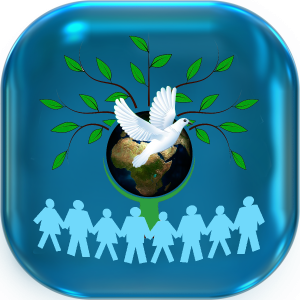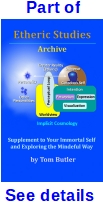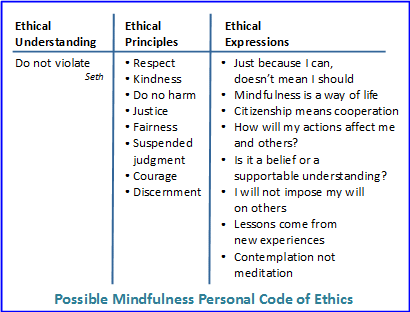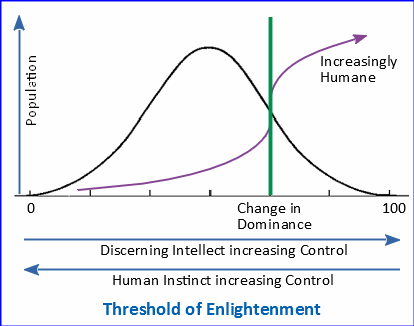
Opinion 8
Abstract
 In the context of this essay, our discerning intellect is an enlightened motivator that moderates our baser, human instincts. If the ideal citizen is one who seeks progression in cooperation with others, rather than at the expense of others, their discerning intellect must dominate decision-making. This Opinion is an exploration of the difference between our human’s instincts and our discerning intellect and how we might move toward a more humanist society.
In the context of this essay, our discerning intellect is an enlightened motivator that moderates our baser, human instincts. If the ideal citizen is one who seeks progression in cooperation with others, rather than at the expense of others, their discerning intellect must dominate decision-making. This Opinion is an exploration of the difference between our human’s instincts and our discerning intellect and how we might move toward a more humanist society.
Logo: Sharing – composite from pixabay.com/images/search/user:geralt/
I used to think that top environmental problems were biodiversity loss, ecosystem collapse and climate change. I thought that thirty years of good science could address these problems.
I was wrong.
The top environmental problems are selfishness, greed and apathy,
and to deal with these we need a cultural and spiritual transformation. And we scientists don’t know how to do that. Gus Speth
This widely referenced quote is from attorney and environmentalist James Gustave “Gus” Spethe. (1) While his statement resonates with humanists-minded people, it is remarkable in that it is from a mainstream scientist. Speth has been at the center of environmental decision-making at the highest levels of government. He is in a better position to know than most of us.
I include the quote here because “… and to deal with these we need a cultural and spiritual transformation.” Is the point of this Opinion.
Toward a Humane Society
My purpose in writing this Opinion is to help elevate humanism as a valued way of life. I defined a humanist in “Why I vote Humanist,” (2) as a person who has adopted a personal code of ethics which emphasizes understanding principles of nature and seeks to live in accordance with that understanding to the benefit of self and others in a cooperative community.
To explain:
- A personal code of ethics – In “A personal code of ethics for the Mindful Way,” (3) I described the importance of adopting and following a personal code of ethics as a means of following the Mindful Way. (24) As discussed below in An Example Code of Ethics, my personal code of ethics begins with “Do not violate.” Remembering to keep attention on the code also keeps attention on looking for new understanding in daily experiences.
- Principles of nature are the Organizing Principles I describe in Your Immortal Self. (4) They are based on the Trans-Survival Hypothesis (5) and resulting Implicit Cosmology. (6) Natural Laws, which are often referred to in New Age literature, follow the same idea but most are defined from a physical world perspective. We are immortal beings and seekers do well to adopt an immortal self-centric perspective. (7)
- Cooperative community – A common question is how to develop psychic abilities. In one way or another, my answer always includes a suggestion that the person finds and participates in a community of like-minded people that allows an exchange of ideas which provoke contemplation. The Cooperative Community Organizing principle is defined in the Implicit Cosmology as Personalities are attracted to communities of like-minded people cooperating to facilitate progression. (8)
I wrote the “Why I vote humanist” Opinion (2) because I was, and continue to be, worried about how our country is turning toward a society that favors capitalism over individual needs. From the perspective of human potential, the obvious problems of capitalism, such as corporate greed, social engineering in the name of religious and ideological beliefs and the urge for personal power, are just symptoms. The more fundamental influence in our society is that the individual citizen’s decision making is dominated by human instincts with little input form discerning intellect.
One Mind, Two Masters
Our sense of self might be described as the lens of a video camera through which we experience the world. Our conscious self is the Experiencer. Our Experiencer is not our survival instincts or discerning intellect. Those are our Motivators. In this Opinion, I am asking you to realize that your experiencer is being controlled by two, often conflicting motivators.
Survival Instincts
We are predominantly a human animal governed by inherited survival instincts. Our human’s instincts have evolved to assure the continuation of our species. The urge to assure the survival of our genes is an imperative that always turns our behavior toward doing things that will further that survival. That is an obviously necessary characteristic for any organism. The problem is that our urge for simple survival is amplified by an additional urge to assure that only our genes survive. So, in effect, people might not just do things to be good parents, providers and protectors for their family. They will do these things at the expense of others if it will help their genes dominate everyone else’s. (23)
We can readily see this gene dominance in nature, but it is less obvious in the behavior of modern, presumably civilized humans. A person who is driven to be first on the promotion list or to have the dominant business in town is likely unconsciously responding to the urge for gene dominance. We just witnessed parents cheating to assure their children’s place in favored universities. The financial 1% are the epitome of gene dominance.
Discerning Intellect
Our second and much less dominant nature is discerning intellect. It is our motive force for such ideals as compassion, love of knowledge, the desire to understand and the need to find meaning in life. While our human’s instincts come fully developed and dominant at birth, discerning intellect typically begins as that small voice in our mind we sometimes think of as our conscience.
Our discerning intellect begins to moderate the influence of our human’s instincts as we mature. But when considered from the perspective of compassion and enlightenment, discerning intellect may never be more than a small influence on the behavior of most people. It is typically only when the person gains the presence of mind to question the implications of his or her actions that it begins to be an effective moderator of instincts. From that questioning comes compassion. See the Threshold of Enlightenment Diagram
Psychologists use altruism as a term for the way discerning intellect manifests as compassion in a person. From the “Psychology Today” website: (9)
Altruism is acting out of concern for another’s well-being. Often, people behave altruistically when they see others in desperate circumstances and feel empathy and a desire to help. Altruism doesn’t always come naturally, since by definition, it requires people to disregard their own concerns to help others without any expectation of reward, …
Katha Upanishad—Mind as Charioteer
There is an important difference in the way people experience the world between allowing instincts to dominate behavior and moderating instincts with discerning intellect. A way of describing this difference is to say that allowing instincts to guide behavior tends to lead to near-term happiness while allowing discerning intellect to dominate leads to long term meaning in life.
The 4,000-year-old Katha Upanishad uses discriminating intellect as a term for explaining how a seeker benefits from deciding the meaningful way over the pleasant way. From the Vedanta Spiritual Library: (10)
1-III-3. Know the Self to be the master of the chariot, and the body to be the chariot. Know the intellect to be the charioteer, and the mind to be the reins.
1-III-4. The senses they speak of as the horses; the objects within their view, the way. When the Self is yoked with the mind and the senses, the wise call It the enjoyer.
1-III-5. But whoso is devoid of discrimination and is possessed of a mind ever uncollected – his senses are uncontrollable like the vicious horses of a driver.
1-III-6. But whoso is discriminative and possessed of a mind ever collected – his senses are controllable like the good horses of a driver.
1-III-7. But whoso is devoid of a discriminating intellect, possessed of an unrestrained mind and is ever impure, does not attain that goal, but goes to samsara.
Samsara is Hindu for the cycle of death and rebirth as life is bound to the material world.
A more contemporary source for the difference between obeying the motivation of our instincts and following the wisdom of our discerning intellect is described in the article, “Is a Happy Life Different from a Meaningful One?”:
From a study of 397 adults, the researchers identified five major differences between a happy life and a meaningful one. (11)
- Happy people satisfy their wants and needs, but that seems largely irrelevant to a meaningful life. Therefore, health, wealth, and ease in life were all related to happiness, but not meaning.
- Happiness involves being focused on the present, whereas meaningfulness involves thinking more about the past, present, and future—and the relationship between them. In addition, happiness was seen as fleeting, while meaningfulness seemed to last longer.
- Meaningfulness is derived from giving to other people; happiness comes from what they give to you. Although social connections were linked to both happiness and meaning, happiness was connected more to the benefits one receives from social relationships, especially friendships, while meaningfulness was related to what one gives to others—for example, taking care of children. Along these lines, self-described “takers” were happier than self-described “givers,” and spending time with friends was linked to happiness more than meaning, whereas spending more time with loved ones was linked to meaning but not happiness.
- Meaningful lives involve stress and challenges. Higher levels of worry, stress, and anxiety were linked to higher meaningfulness but lower happiness, which suggests that engaging in challenging or difficult situations that are beyond oneself or one’s pleasures promotes meaningfulness but not happiness.
- Self-expression is important to meaning but not happiness. Doing things to express oneself and caring about personal and cultural identity were linked to a meaningful life but not a happy one. For example, considering oneself to be wise or creative was associated with meaning but not happiness.
The Greatest Threat of All
In his essay, “The Greatest Threat of All: Human Instincts Overwhelm Reason,” David Ropeik argues that we are destroying ourselves by blindly following our human’s instincts. (12)
You woke up each day last year and went about your business as any human does, compelled by deep and ancient instincts to do the things necessary to get yourself safely to bed at night.
And later:
We are compelled from the deepest level of our genes and survival instincts to taking more from the system than it can provide and put back in more waste than it can handle, and no amount of human brain power outwit the natural instincts that are driving us 150 miles an hour toward a cliff.
And last:
Dangerous, because the belief that our intellect can provide the tools and enlightened leadership that will ride to the rescue, arrogantly denies the inescapable truth that we are still mostly instinctive animals, each of us compelled by deep subconscious urges to do what we can as individuals to survive today; and the day after that, and everybody else, are just not as much of a concern.”
Ropeik was addressing how being controlled by instincts leads us to ignore greater, less obvious threats to our survival. This is the problem of our human’s instinctive response to cultural influences (Worldview) versus our conscious examination of our actions guided by discerning intellect.
Toward a Humane Society
Unless people become aware of the difference between their human’s instincts and their discerning intellect, their human’s instincts will dominate their behavior and hinder the progression of their spiritual nature. It is arguable that the enlightenment mystics speak of is not achieving an exalted state of spirituality but simply becoming aware there is such a state and then understanding the need to seek it.
Enlightenment represents a change in attitude from desiring to live the good life to seeking meaning in life. As is illustrated in the Threshold of Enlightenment Diagram (below), even though they may be aware of the concept, most people do not experience this change. I believe the remedy is education. When people understand the difference, they will begin to consciously develop discerning intellect. By doing so, it is my belief that they will also turn toward conscious humanitarianism.
Recognizing the Difference
“Just because you can does not mean you should” has become a symbolic phrase for me which highlights our need to share this world. It stuck in my mind one day when I watched a jacked-up pickup roar away from a stop sign. I knew with a great deal of certainty that the driver was antisocial because the bumpers on the truck were so high, most compact cars would go under it in an accident. It was way too noisy, and the driver was driving as if he imagined himself on a raceway.
Of course, the driver might have been a wonderful, caring person who always tries to be a good citizen. The modified pickup is style and the slightly aggressive driving is fun. There are also too few police, making a little out-of-bounds behavior safe from any obvious penalty. But therein is my point. The driver was able to be that way. There were no enforcers to change his behavior. According to his human’s instincts, social status probably came with the behavior, thus further assuring gene dominance.
I tend to be a little too righteous about such things, but it is a learned response. With a little shade tree self-psychoanalysis, I have decided my negative response toward the pickup truck driver comes from the understanding that he antisocial nature is unnecessary. Just because he could turn his truck into a threatening, unstable mass of noise did not mean it was the right thing to do.
Here are a few more examples of the kinds of violations I am trying to describe:
Society only works when people share
- Cutting off another car in traffic or cutting in line at an event is stealing space. It is a rude violation in the social context, but it also threatens people’s sense of safety. Road rage is a symptom of such minor affronts.
- Simply living necessarily produces some waste but producing that waste without considering its impact on others is a violation of the greater good. For instance:
- Burning wood is a very inefficient source of energy that pollutes the air. Burning wood for heat or cooking produces air pollution that has been shown to harm people and shorten life. See “Air Pollution: Current and Future Challenges” (13) and “Report: Reno air quality worsens.” (14)
- Most communities have rules about noise pollution such as barking dogs, loud cars and loud music. Such noise increases personal stress and reduces the quality of life. However, the offenders are seldom reported out of fear of retaliation. Consequently, there is little feedback to the offenders to the effect that their behavior is not okay.

Air inversion over Reno, Nevada. Taken January 4, 2019. Burn Code was green the night before and there was prescribed burning (burning tree trimmings in the forest).
- Target practice is one of the major causes of forest fires. Guns are designed to kill. Carrying a gun in public is a powerful form of intimidation. While the gun owner may feel a greater sense of safety, the presence of a device intended to kill violates people’s sense of safety. According to “Is someone holding a gun more likely to think others are armed? New study says yes”: (15)
When people have a gun in their hand, they’re more likely to believe an object held by someone else is also a gun. They’re also more likely to raise the gun to shoot.
In other words, a repose to fear is to own a gun. Owning a gun makes the person more fearful.
- Off-road vehicles cause considerable damage to the countryside and diminish the quality of life for those wishing to share the space. See “Off-Road Use of Motorized Vehicles.” (16)
- Public forums on the Internet are an important means of social interaction. A cooperative community of like-minded people offers opportunities for the exchange of ideas and further education. However, thoughtless, mean-spirited or off-topic comments can defeat the effectiveness of such forums.
None of these behaviors are illegal. In some communities, they are not even discouraged, yet individually, people react to being on the receiving end of these behaviors with a sort of primal urge to make them go away. It is our human’s nature. Loud noise provokes a flight or fight response which is quickly replaced with an aggressive urge to respond in kind.
Individual violations may not be seen as an issue. However, they pose a considerable problem for society as the effect of those individual violations accumulate. We refer to the effect as stress. Such stress influences decisions and has the potential of more aggressive reciprocal responses as human instincts motivate the person to yield or seek to dominate.
Truth
In “When did lying become the new normal in America” Craig Farrand observes that: (17)
Whereas only yesterday we placed a premium on the truth — fearing the consequences of lying — it seems no longer to be the case.
Instead, in some quarters, expediency has become the most important thing; ends justifying the means has become today’s modus operandi.
And provable, truthful facts have become fluid currency.
Like a cancer than has metastasized, this emerging trend is spreading beyond its original bounds, infecting other areas of the body politic.
As I write this, the president is telling another … untruth. People who work for him routinely lie. Much of the media that supports him publish propaganda, rather than legitimate journalism. In fact, we are subjected to a host of violations from our government in the form of lies and deception.
Alternative facts –From “Dictionary.com”: (18)
Kellyanne Conway, an advisor to President Donald Trump, used the euphemism alternative facts … to describe false statements made by the press secretary Sean Spicer on January 21, 2017, the day after Donald Trump took office….
In conversations about alternative facts, the words post-fact and post-truth often come up. Post-fact and post-truth refer to an environment in which objective facts are a thing of the past. In a post-fact society, facts are viewed as irrelevant and emotional appeals are used to influence public opinion….
Lobbyists buy legislation – From “Big Think”: (19)
Lobbying is conducted away from the public eye,” explained Brulle. “There is no open debate or refutation of viewpoints offered by professional lobbyists meeting in private with government officials. Control over the nature and flow of information to government decision-makers can be significantly altered by the lobbying process and creates a situation of systematically distorted communication. This process may limit the communication of accurate scientific information in the decision-making process.

Misleading statements – From “Flackcheck.org”: (20)
On the page, we parse misleading political communication into six main categories.
Misunderstanding the Process identifies ways in which misleading assumptions about the nature and extent of executive or legislative power drive problematic promises, attacks and self-congratulatory communication. So, for example, the complexity of the legislative process makes it possible for bills and votes to be misconstrued.
Misleading Use Of Language features ways in which politicians exploit the ambiguities and connotations in words to prompt unjustified conclusions.
Misleading Audio/Visual Cuing illustrates how pictures and sound can be manipulated to elicit false inferences.
Misleading By Not Telling The Whole Story focuses attention on the process by which political sins of omission, including selective uses of evidence, deceive.
False Logic covers common errors in argument that lead audiences to faulty conclusions.
Hypocritical Attack examines statements that apply a different standard to one candidate than to another or imply a difference between candidates where none in fact exists.
Deception is not just a problem with politics. There are many ways that people deceive people in everyday life. Bait-and-switch is common in merchandising. Computer and cellphone apps often begin as a free version but must be updated to an expensive “pro” version that has the features needed to fully use the free version. We tell white lies to avoid embarrassment, punishment, duty.
Lying, deception and misleading are not okay. Yet it is so common today that we are beginning to accept it as normal. Every time we hear a lie and say nothing, in some small way, we increase our tolerance for lies. It eats away at society. It empowers our human’s instincts.
It makes it seem more okay to lie.
Litmus Test for Truthful Speech
Something is actual or it is not. If it is conditionally actual, it is necessary to state the conditions. If something is not known to be actual, it is necessary to say so. “I don’t know” is a perfectly good response.
I can hear you suggesting all sorts of reasons why something might not be actual but still be true. That is where “Ya, buts” come in. We are good at making excuses and spinning deceptive statements to seem actual. To further empower your discerning intellect, it is necessary to decide to always seek to understand the actual.
Actual Paranormal
The study of apparent paranormal phenomena is complicated by the combination of objectively physical and probably conceptual effects. We think we know what we physically sense and the thoughts we have, but good science is teaching us that we do not yet have the understanding we need to be sure. See “How We Think.” (21)
One solution is to proceed with the study without deciding whether to believe the results. I call that suspended judgment. Once a decision to accept or not accept evidence is made, our mind is very reluctant to change. Practicing suspended judgment helps us keep an open mind to more objectively consider new information.
The same need to suspend decisions about ambiguous information applies to everyday life. We do not have to say it is this way or that. We can just say what we think we know and resist characterizing what we say. However, it is important to make sure your witnesses understand your qualifications to say one way or another. Saying something like “Electronic Voice Phenomena are just stray radio waves” under the cloak of academic authority is not okay if you are a biology or philosophy professor and have not studied the subject.
Ethics of Citizenship
I wrote A Personal Code of Ethics for the Mindful Way (3) to describe a technique for making the Mindful Way a part of daily living. It is included here as a useful tool for self-checking the influence of instincts.
The idea is to question the implications of what we think, say and do as those actions relate to how we affect others. In doing so, we begin to notice the relationship between our actions and the way the world works around us. With persistence, understanding follows. With understanding come increasing lucidity as we learn to align our personal sense of reality with actual reality.
An Example Code of Ethics
Here is a suggestion for a personal code of ethics. It should be useful for anyone and any level of society. The idea is to use foundation ethical ideals for Ethical Understanding (Tier 1) which sets the tone for the code. Seth’s Do not violate is an excellent foundation concept. (22)
Ethical Principles (Tier 2) is concerned with reasonably basic principles which complement or further define Do not violate. These should be intuitively obvious in the context of your personal progression. Select terms that first come to mind when you stop to consider the implications of what you are doing. For instance, Respect is short for “Am I respecting … ?” Suspended judgment is short for “Am I unnecessarily locking in a decision?”
Ethical Expression (Tier 3) is concerned with how Tier 1 and 2 are expressed in daily living. Expressions include phrases intended to provide guidance for how to live by the Organizing Principles. (8) Catchy phrases are useful here, as they make it easier to remember the principles.
You will likely want to add Principles and Expressions as you become accustomed to working with the code. Be careful not to overcomplicate it, though. It is important that you can remember the elements so as to apply them as warranted.
Having and seeking to follow a personal code of ethics is an effective way to follow the Mindful Way. We are responsible for all our actions. That means we need to consider the implications of our every thought and every action to be sure our discerning intellect is making the decisions and that we are not on instinctual autopilot. In doing so, we begin to teach our mostly unconscious perception and expression processes to make the next thought and action more in accord with our ethical code. In time, it becomes part of who we are.

I am suggesting a personal code of ethics in this Opinion about humanism because “Do not violate” applies to the environment and our fellow life forms sharing this planet. This Opinion was almost titled “Sharing” because a humanist understands the need to share our world, its resources and the quality of life it offers with others … both human and creature, plant and Mother Earth.
Ethical Conduct is a Lifelong Learning Experience
Learning to live by a personal ethical code often means realigning our unconscious mind away from our human avatar’s survival instincts and cultural dogma we have been conditioned with over the years. Such a change in consciousness takes time and attention which comes through experience.
Fork in the Road
Current news is showing that stable democracies can turn into totalitarian states in a very short time. As I write this Opinion, The USA is being pushed toward such a totalitarian state by the President and self-serving conservatives. Prejudices divide much of the world into us and them. Fear coupled with ignorance and unbridled human instincts have come together to promote gun ownership as a right and necessity. Acceptance of conspiracy theories based on maybes and faith-based rejection of science is moving the world toward ecosystem collapse.
None of these problems are necessary. All are the product of human instinct’s dominance over discerning intellect.
Education is an important remedy for the world, but decisions based on compassion rather than capitalist principles appears to be necessary to save the day. This Opinion makes that point as clearly as I know how. It is up to all of us to understand the material and act on it as if the lives of our family, community, nation and the world are in the balance.
References
- “James Gustave Speth.” Ballotpedia. ballotpedia.org/James_Gustave_Speth.
- Butler, Tom. “Why I Vote Humanist.”Etheric Studies. ethericstudies.org/humanist-2018/.
- Butler, Tom. “A Personal Code of Ethics for the Mindful Way.” Etheric Studies. ethericstudies.org/code-of-ethics/.
- Butler, Tom. Your Immortal Self, Exploring the Mindful Way. AA-EVP Publishing, 2016. ISBN 978-0-9727493-8-1.
- Butler, Tom. “Trans-Survival Hypothesis.” Etheric Studies. ethericstudies.org/trans-survival-hypothesis/.
- Butler, Tom. “Implicit Cosmology.” Etheric Studies. ethericstudies.org/implicit-cosmology/.
- Butler, Tom. “Personality-Centric Perspective.” Etheric Studies. ethericstudies.org/personality-centric-perspective/.
- Butler, Tom. “Organizing Principles.” Etheric Studies. ethericstudies.org/organizing-principles/.
- “Altruism.” Psychology Today. psychologytoday.com/us/basics/altruism.
- (Translator) Panoli, Vidyavachaspati V. “Katha Upanishad.” Vedanta Shastras Library com/upanishads-krishna-yajur-veda/katha-upanishad/.
- Marsh, Jason; Suttie, Jill. “Is a Happy Life Different from a Meaningful One?” Greater Good Science Center at UC Berkeley. greatergood.berkeley.edu/article/item/happy_life_different_from_meaningful_life.
- Ropeik, David. “The Greatest Threat of All: Human Instincts Overwhelm Reason.” Psychology Today. psychologytoday.com/blog/how-risky-is-it-really/201501/the-greatest-threat-all-human-instincts-overwhelm-reason.
- “Clean Air Act Overview: Air Pollution: Current and Future Challenges.” United States Environmental Protection Agency. epa.gov/clean-air-act-overview/air-pollution-current-and-future-challenges.
- “Report: Reno air quality worsens.” kolotv.com. 2016. kolotv.com/content/news/Reno-air-quality-worsened-in-2016-376361161.html.
- Perry, Susan. “Is someone holding a gun more likely to think others are armed? New study says yes.” 2012. minnpost.com/second-opinion/2012/03/someone-holding-gun-more-likely-think-others-are-armed-new-study-says-yes/.
- “Off-Road Use of Motorized Vehicles.” Sierra Club. sierraclub.org/policy/road-use-motorized-vehicles.
- Farrand, Craig. “When did lying become the new normal in America.” News Harold (Southgate, MI). thenewsherald.com/opinion/when-did-lying-become-the-new-normal-in-america/article_867851b0-de3f-5c16-a16b-a4d6a68cdcdf.html.
- “Alternative Facts.” Dictionary.com. dictionary.com/e/slang/alternative-facts/.
- Ratner, Paul. “How lobbyists buy climate change legislation.” Big Think. bigthink.com/paul-ratner/how-lobbyists-bought-climate-change-legislation.
- “Patterns of Deception.” Flackcheck.org. 2019. politics.flackcheck.org/patterns-of-deception/.
- Butler, Tom. “How We Think.” Etheric Studies. ethericstudies.org/how-we-think/.
- Jane Roberts Learning Center. sethlearningcenter.org/.
- Rhoads, Dan. “Selfish Genes and Gene-Centered Evolution.” 2009. bitesizebio.com/1344/selfish-genes-and-gene-centered-evolution/.
- Butler, Tom. “The Mindful Way.” Etheric Studies. ethericstudies.org/mindfulness/.
- “Aftermath of clear-cutting in Grassy Narrows.” Rainforest Action Network. Flickr. 2006. flickr.com/photos/rainforestactionnetwork/199891093/.
![]()

